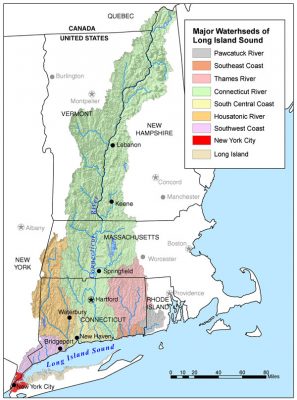Agricultural Water Security

UConn Extension is helping agricultural producers in Connecticut enhance water security and prepare for drought. We offer a variety of resources for those interested in water management and optimizing irrigation efficiency. We have worked with vegetable, fruit, nursery, greenhouse and dairy operations to support increased production and strategic water systems design.
In February 2016, we launched the first statewide agricultural water survey. The survey, the first effort to document water use in Connecticut agriculture, and subsequent water metering datasets, are being used to establish baseline standards for water use for all types of agricultural operations in each of the state's eight counties.
Throughout 2016 and 2017, we supported farmers with technical assistance in irrigation management and connected them to funds available through NRCS EQIP for water wells, irrigation pipeline, groundwater testing and other water-related conservation practices
Soil Conservation and Health
The Long Island Sound Watershed Regional Conservation Partnership Program (LISW-RCPP) is a landscape scale initiative that aims to reduce nutrient loading of the Long Island Sound. The University of Connecticut's Extension is tasked to coordinate the development and implementation of comprehensive plans on working lands with a key focus on nutrient management and soil health.
How do we reduce the impact of nutrients and fertilizers on water quality? Increase farm productivity and profitability? Improve farm resiliency? Hold more water in the soil profile? Sequester more carbon? Increase wildlife and pollinator habitat? Improve the condition of our forests and grazing lands? Reduce agricultural energy use? It all starts with a plan.
Conservation plans.pdf can transform our future by giving landowners and operators step-by-step science-based recommendations they can use to improve water quality, wildlife habitat, pest management, soil health, and yields while reducing energy and input costs.
Examples of Conservation Practices Include:
Soil Health and Nutrient Management
Soil tests are an important first step at assessing current soil resource conditions in order to adopt management strategies that promote nutrient retention and cycling within fields saving the producer time and money. The University of Connecticut Extension is working to support Connecticut farmers with a limited number of free soil tests at UConn’s Soil Nutrient Analysis Laboratory in exchange for partnering with our conservation practice research. It’s that easy!
A fully functioning soil provides nutrients throughout the growing season at the least cost. Maximizing soil health is essential to maximizing profitability while minimizing environmental losses. Principles for improving soil health include minimizing soil disturbance, maximizing year-round roots in the ground, and increasing plant diversity. Conservation planning uses a systems approach to increase soil function and reduce environmental losses. In collaboration with regional Conservation Districts, we hope to expand technical assistance to eligible agricultural producers, especially those not previously reached by USDA NRCS programs.
Visit the UConn CLEAR Changing Landscape Connecticut and Long Island Sound Land Cover and Change website for detailed watershed information.
Changing Landscape is a remote sensing-based land cover study that charts landscape changes in Connecticut and portions of New York. It covers the 30-year period from 1985 to 2015 (with in-between dates of 1990, 1995, 2002, 2006 and 2010). It includes information on basic land cover, as well as subsidiary analyses of riparian corridor land cover, impervious cover and forest fragmentation analysis.
Contact
| Phone: | (860) 486-3581 |
|---|---|
| E-mail: | extension@uconn.edu |
| Address: | 1376 Storrs Road, U-4134 Storrs, CT 06269-4134 |
